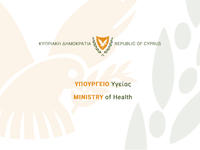Press Releases

29-04-2020 20:56
Groups of citizens with the higher risk of becoming seriously ill from COVID-19
The following groups have been selected based on the existing literature and taking into consideration the epidemiological indicators so far of COVID-19 globally and in the Republic of Cyprus.
Category A
Patients who belong to the following groups may report for work provided they are not in an environment dealing with the public and where there is increased movement of people.
1.Persons 65 years of age and older.
2.Pre-existing Chronic Respiratory Disease (e.g. chronic obstructive pulmonary disease, bronchial asthma of moderate severity)
3.Chronic Renal Failure (creatinine clearance 15-30 ml / min).
4. Type 1 and / or diabetes mellitus with target organ damage (chronic renal failure, cardiovascular disease, retinopathy, chronic peripheral neuropathy – unless it falls under category B).
5. Nosocomial obesity BMI> 40.
6.Hemoglobinopathies (homozygous thalassemia, sickle cell anaemia).
7.Chronic liver failure Child-Pugh C score.
8.Severe genetic coagulation disorders.
9.Neuromuscular diseases.
10.Pregnant women, regardless of gestational age, and mothers who are breastfeeding.
Category B :
Patients who belong to the following groups are considered very high risk and are advised to work from home
1.Pre-existing Chronic Respiratory Disease (e.g. severe bronchial asthma, patients on chronic oxygen therapy or non-invasive ventilation [CPAP or BiPaP] at home, severe pulmonary hypertension (NYHA III and IV), severe pulmonary fibrosis, pulmonary lobectomy.
2.Severe Chronic Renal Failure (creatinine clearance <15 ml / min and hemodialysis).
3. Heart arrhythmia with permanent defibrillator or heart disease with permanent defibrillator and amphibole pacemaker.
4.Heart failure of any etiology (ischemic or non-ischemic) or stage according to NYHA III or IV.
5. Cardiovascular disease:
i. Recent acute coronary syndrome or vascular surgery: angioplasty or stent implantation in the last 12 months.
ii. Aortic-coronary bypass (CABG) in the last 12 months.
iii. Recent AEE in the last 12 months or with established neurological semiology.
6.Myocarditis ( documented history of myocarditis, hypertrophic, dilated, infiltrative (amyloidosis)).
7.Congenital heart disease after surgical correction with significant residual impairment or non-corrected congenital heart disease with significant residual impairment.
8.Active use of biological agents (e.g. TNF inhibitors, interleukin inhibitors) or other immunosuppressive drugs.
9.Active chronic corticosteroid administration (≥ 20mg prednisone or equivalent for ≥ 1 month).
10.Patients with a history of transplantation of solid organs or primordial hematopoietic cells.
11.Patients with co-morbid or hematological malignancies receiving chemotherapy or radiation or immunotherapy.
12.Patients with HIV or patients with CD4 lymphocyte count <200 / mm3.
13.Hereditary or acquired immunodeficiency.
( DC )
Relevant Press Releases







